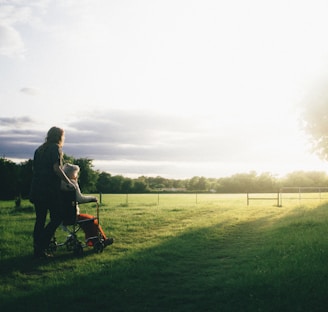When Someone Dies: A Gentle Guide for the First Steps
You didn’t come this far to stop


We’re so sorry you’re here under these circumstances. If someone close to you has just died, and you’re feeling shocked, numb, or overwhelmed, please know that’s completely normal. Most people don’t know what needs to happen next, especially if there was no clear plan in place. That’s where we come in.
This page is here to walk you through the essential steps, calmly, clearly, and with care. Please use it to help you make sense of what needs to happen in the first days and weeks.
You don’t need to do everything at once ... just one step at a time.
We’re here to walk beside you. Please reach out if you need support.
Immediate Actions: What to Do Right After a Loved One Dies
Whether the death was expected or unexpected, knowing what steps to take immediately can feel overwhelming. Here’s a simple guide to help you in those first moments:
If the Death is Unexpected:
Call emergency services (000): If the death has occurred suddenly and unexpectedly, contact emergency services to confirm the death.
Secure the area: If the person died at home, make sure the area is secure before anyone else enters.
Contact a family member or close friend: It can be helpful to have someone with you for support at this stage.
If the Death is Expected (At Home):
Contact the doctor or attending medical professional: If your loved one has died at home, reach out to the doctor or attending medical professional who was overseeing their care to confirm the death.
Locate the Will: Check to see if your loved one has left any specific funeral or burial instructions in their Will. Since the death was expected, hopefully you'll know their wishes, as well as the location of their Will.
Call the funeral director: If there are no specific instructions in the Will, or after locating them, contact a funeral director to guide you through the arrangements. If this is your first time dealing with a funeral home, take your time to ask for recommendations from family or friends, or contact several homes to see which one feels right for you. There is no urgency to have your loved one transported, so take your time to sit with them until you're ready for this to happen.
Notify immediate family members: Let those closest to you know so they can offer support.
If the Death is Expected (In Hospital or Nursing Home):
Notify the attending staff: Hospital or nursing home staff will confirm the death and manage the next steps.
Request a death certificate: Ask the staff about obtaining a Medical Certificate of Cause of Death.
Locate the Will: Check to see if there are any funeral instructions or preferences in the Will before contacting the funeral director. Hopefully, if your loved one is in a hospital or nursing home, these conversations will have taken place, and you'll know what their wishes are.
Contact a funeral director: They will arrange for transportation and take care of the necessary paperwork.
After you've taken these immediate actions, you can proceed with registering the death and dealing with the legal and financial aspects, such as securing important documents like bank details or insurance.
If your loved one was our client, they will either have a Legacy Kit (hopefully completed) or will have had a consultation with us and have some completed documentation. If so, locate the Legacy Kit or paperwork as early as possible, as this will guide you through everything that's needed to work through their estate. If you're unsure, please feel free to reach out, and we can let you know if they had a consultation with us.
What To Do When Someone Dies
This checklist guides you through the immediate actions and key steps to take in the days and weeks following the death of a loved one.
First 24–72 Hours:
Obtain a Medical Certificate of Cause of Death
Usually a doctor, hospital, or nursing home will provide this
Locate the Will and identify the executor
Check for any funeral wishes or pre-paid plans in the paperwork or the Will
Contact a funeral director
Secure the home and belongings
Notify close family and friends
Check the section titled "What Is Probate?" below to find out whether the estate requires Probate
First Week:
Register the death with the relevant state or territory's Registry of Births, Deaths and Marriages
The funeral director may do this on your behalf
Obtain several copies of the death certificate
If you haven't located a Will already, check home files, safe deposit boxes, or contact their solicitor
Weeks 2 and beyond:
Redirect mail
Cancel or transfer services:
Subscriptions, memberships, phone, internet, home care, etc.
Notify relevant institutions of the death:
Banks, Centrelink, Medicare, utilities, insurance, super funds, ATO, etc.
If there are any disputes over the Will, you may need to seek legal advice
Begin Estate Administration (see below)
Executor’s initial responsibilities:
Make an inventory of assets and debts:
Bank accounts, superannuation, insurance, real estate, shares, vehicles, valuables, personal loans, credit cards, mortgages
Apply for a Grant of Probate* (if required)
If there was no Will, apply for Letters of Administration
Apply for access to accounts (you’ll need the death certificate and proof of your role as executor)
What Is Probate?
A Grant of Probate is required when someone dies with a valid Will, and their estate includes certain types of assets that cannot be released without legal authority. Here's a breakdown to clarify when it's typically needed:
The estate includes real estate (e.g. a house or land) in the deceased’s name alone.
There are significant bank or investment accounts solely in the deceased’s name (banks usually have thresholds - often around AUD $50,000, but it varies by institution).
The deceased held shares or managed funds in their name.
The estate involves superannuation or life insurance, and the payout is to the estate (not to a named beneficiary).
There is no surviving joint owner for assets like property or bank accounts.
A Grant of Probate is often not required if:
All assets were held jointly with someone else (e.g. a spouse). These typically pass automatically to the surviving joint owner.
The estate is small and straightforward, and institutions (like banks) are willing to release funds without a grant.
There’s no real estate and minimal assets.
Special note:
If there’s no Will, you’d apply for Letters of Administration instead of a Grant of Probate.
Even if Probate isn’t strictly required, it may be advisable if disputes are possible or if the executor wants formal protection in distributing the estate.
You're Not Meant to Carry This Alone
Experiencing the death of someone you love changes everything. In the midst of the paperwork, decisions, and to-do lists, it’s easy to forget that you’re grieving .... in shock, overwhelmed, or simply trying to breathe through the pain.
Please know: you don’t have to do it all at once, and you don’t have to do it alone.
Whether you're feeling numb, heartbroken, angry, or utterly exhausted, all of it is valid. Be gentle with yourself. Rest when you can. Accept help when it’s offered. If you're struggling to cope, there are kind, experienced grief counsellors and support services available who understand this depth of loss.
This page can help you navigate the practicalities, but your emotional well-being matters just as much. We’re here to walk with you, not just through the logistics, but with care for your heart, too.
Where to Find Grief Support in Australia
If you're finding it hard to cope or just need someone to talk to, the following services offer confidential, compassionate support:
Griefline – Free telephone and online counselling, plus grief support resources.
Website: www.griefline.org.au
Phone: 1300 845 745 (available 8am–8pm AEST, 7 days)Australian Centre for Grief and Bereavement – Offers counselling, support groups and resources.
Website: www.grief.org.au
Phone: 1800 642 066Beyond Blue – For emotional support, especially if you’re feeling anxious, depressed or overwhelmed.
Website: www.beyondblue.org.au
Phone: 1300 22 4636 (24/7)Lifeline – 24/7 crisis support and suicide prevention services.
Website: www.lifeline.org.au
Phone: 13 11 14 (24/7)
